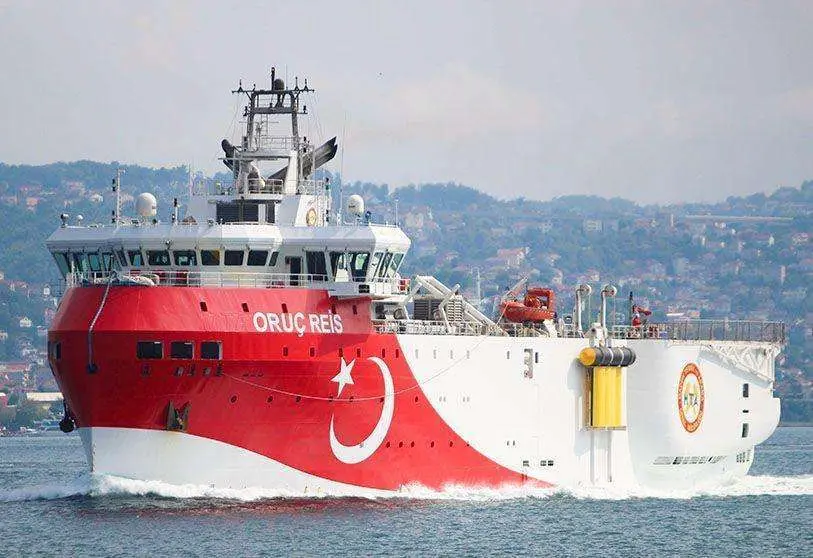Turkey reinforces its fleet and plans new hydrocarbon exploration in the eastern Mediterranean

A fourth Turkish drillship will join Ankara's hydrocarbon exploration operations in August in the eastern Mediterranean, an area where it rivals Israel, Lebanon, Greece, Cyprus and Egypt for natural resources. Vice President and former Deputy Prime Minister Fuat Oktay announced the imminent arrival of the new vessel, named Abdulhamid Han in honour of the 34th Ottoman Sultan, during a ceremony held in the Turkish Republic of Northern Cyprus on the occasion of Peace and Freedom Day on 20 July. A symbolic gesture, gasoline for nationalism.
At 238 metres long, 42 metres wide and weighing 68,000 tons, the 'Abdulhamid Han' will become the most powerful vessel in the fleet of the "Mavi Vatan" (in English, Blue Homeland), the Turkish maritime doctrine deployed four years ago with the aim of imposing its dominance over the waters of the eastern Mediterranean, largely controlled by Greece, "on the basis of the sovereignty rights that belong to Turkey", according to the government's version. The new vessel has a maximum drilling depth of 12,200 metres, a 104-metre tower and a crew capacity of 200.
"The hydrocarbon resources of the Mediterranean are not the playthings of the Greek Cypriots. None of the attempts to exclude Turkey and the Turkish Republic of Northern Cyprus in the Eastern Mediterranean have succeeded and will not succeed," the Turkish vice-president stressed from Nicosia. He praised the qualities of the vessel Abdulhamid Han, acquired in November by the state-owned energy company Turkish Petroleum Corporation (TPAO) to accompany the Fatih, Yavuz and Kanuni, the other components of the Turkish fleet. Until now, the vessel has been active in the southern port of Taşucu.
The move, trumpeted in the pro-government media, could reignite political and territorial disputes with Greece and Cyprus. In August 2020, Turkey launched military manoeuvres in Mediterranean waters after learning that its rivals had conducted joint naval exercises in the face of escalating tensions. That was the climax. It was then that a long-standing, multifaceted conflict was on the verge of erupting. From the delimitation of territorial waters to the territorial division of the island of Cyprus and the exploitation of vast energy resources.
Abdülhamid Han sondaj gemimizin önümüzdeki ay Akdeniz’de faaliyetlerine başlaması planlanıyor. pic.twitter.com/dTQknW5qeM
— Fuat Oktay (@fuatoktay) July 20, 2022
The NATO allies, whose leaders have barely kept channels of dialogue open since Turkish President Recep Tayyip Erdoğan decided to veto talks with Greek Prime Minister Kyriakos Mitsotakis for pushing against the sale of F-16 fighter jets to Turkey during his visit to the US, have been engaged in a series of dialectical - and not just dialectical - clashes over hydrocarbons and other jurisdictional issues. Recently, Ankara has accused Athens of violating the airspace and status of the Aegean islands to deploy military bases, accusations flatly rejected by the Greek authorities.
The day and location of Oktay's announcement is no coincidence. Nicosia is the capital of Cyprus, an island fragmented into four parts. Greek Cypriots control the south-western half and Turkish Cypriots the north-eastern. A line marks the dividing line, the so-called buffer zone managed by the UN. Finally, the UK controls two areas of Sovereign Base Areas as a colonial power, which were never ceded. On 20 July 1974, a Turkish military intervention following a Greek Cypriot coup d'état to annex the island to Greece led to partition, which is still in force today.
Cyprus is a member of the European Union. In fact, it is the latest member state to undergo one or more partitions. The Greek Cypriot part functions with broad autonomy and is recognised by the international community, while the Turkish Cypriot half is 'de facto' controlled by Turkey, the Eurasian nation being the only one to recognise its sovereignty. International law, however, is not a problem for Erdoğan, who has been pushing for years for an equitable sharing of energy resources near the island of Cyprus.
The status quo does not benefit Ankara, which has boycotted Athens' efforts to declare an exclusive economic zone (EEZ) in the tiny but numerous Greek islands scattered off the Turkish coast, the longest in the Mediterranean, a legal conquest that would eliminate Turkey's ability to manoeuvre in one fell swoop. Dialogue, the only way contemplated by international law to resolve the dispute, has stalled. The parties are reluctant to reach an agreement and the proliferation of vessels only fuels friction.









